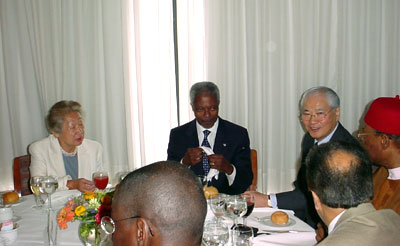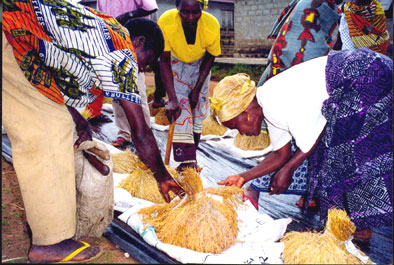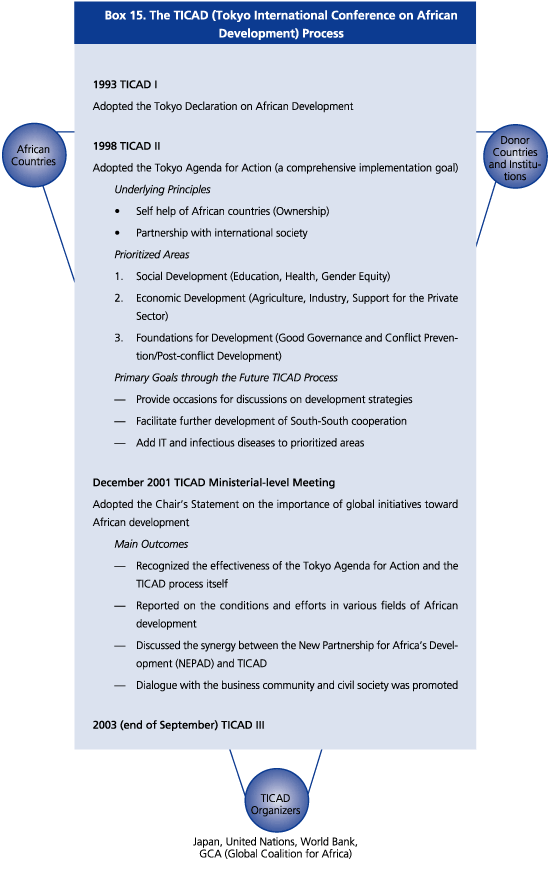Official Development Assistance (ODA)
Japan's ODA White Paper 2002
Part I. Trends in Japan's ODA in a Rapidly Changing World
Chapter 2, Section 2
(2) Growing International Concern about Africa's Problems
The African Union and the New Partnership for Africa's Development Africa has the largest share of impoverished people in the world and faces a concentration of difficult problems, such as conflict, famine, infectious diseases (especially HIV/AIDS), and heavy debt. It is a region that is most seriously beset by development issues. Africa has been left out of the trend toward economic integration, which is accelerating in step with globalization. As a result, the gap between Africa and other regions is widening. Africa's development problems were thus the focus of international concern at the Group of Eight (G8) Summit--which, as noted earlier, adopted the G8 Africa Action Plan--and at the WSSD. (See Chapter 1, Section 2 [1].)
- (1) What Is NEPAD?
- The New Partnership for Africa's Development (NEPAD) is an initiative by Africa that was adopted at the July 2001 summit meeting of the African Union (NEPAD was initially called the New African Initiative and was renamed in October 2001). First proposed by President Thabo Mbeki of South Africa, the initiative was developed initially by South Africa, Nigeria, and Algeria, with Egypt and Senegal later joining as co-sponsors
- (2) Objectives of NEPAD
- Not being subordinated to the assistance of the international community but based on Africa's own responsibility to eradicate poverty to attain sustainable growth and development, and to be integrated into the global economy, it seeks to forge a partnership with the international community, in which international support complements the self-help efforts (ownership) of the African countries.
- (3) Development Strategy
-
- Recognition that conditions for development include peace and security; democracy and good political, economic, and corporate governance; and the promotion of regional cooperation to expand markets and to enhance competitiveness
- Identification of specific priority sectors, such as infrastructure, human development, agriculture, the environment, culture, and science and technology
- Mobilization of development resources, such as the securing of funds through debt relief, ODA, and attracting of private investment, and achieving of greater market access through the diversification of production and the promotion of exports
- (1) Initiative by Africans Themselves
-
- Expression of African ownership of the development process, rather than being a reaction to international requests
- Proposals based on Africans' own awareness of what to do, rather than on demands by donor countries
- Redefining of the partnership with the international community as complementing the ownership of Africans
 Reflection of TICAD's basic philosophy of ownership and partnership
Reflection of TICAD's basic philosophy of ownership and partnership
- (2) Focus on Governance
-
- Identification of governance-related problems as priority issues in Africa's development
- Introduction of the African Peer Review Mechanism (APRM)
 Heightened awareness of the linkage between governance and the expansion of ODA, private investment, and trade
Heightened awareness of the linkage between governance and the expansion of ODA, private investment, and trade
- (3) Focus on Regional Cooperation
-
- Endorsement of regional, rather than national, approaches
 Deepening of interdependence among African states contributing to regional stability
Deepening of interdependence among African states contributing to regional stability
- Endorsement of regional, rather than national, approaches
- (4) Utilization of Private-Sector Funds
-
- Use of private-sector funds, especially by attracting foreign direct investment through Africa's own efforts, rather than relying on ODA from donors
 More efficient use of resources through the utilization of both ODA and private funds
More efficient use of resources through the utilization of both ODA and private funds
- Use of private-sector funds, especially by attracting foreign direct investment through Africa's own efforts, rather than relying on ODA from donors
- (1) AU Summit
- The AU Summit shall grant final approval to various NEPAD policies to ensure that NEPAD is a development initiative of Africa as a whole.
- (2) Implementation Committee
- The Heads of State Implementation Committee comprises 20 African heads of state?4 from each of the five regional subgroupings, in principle, as classed by the AU?and is chaired by President Olusegun Obasanjo of Nigeria. The committee makes decisions regarding NEPAD policies and projects and submits a report to the AU Summit. The committee is composed of the following states as of December 2002:
-
Northern Africa: Egypt, Algeria, and Tunisia
Western Africa: Nigeria, Senegal, Mali, and Ghana
Central Africa: Cameroon, Gabon, and the Republic of Congo
Eastern Africa: Ethiopia, Rwanda, and Mauritius
Southern Africa: South Africa, Botswana, Mozambique, and Angola - (3) NEPAD Steering Committee
- The Steering Committee comprises special representatives from the five founding members (South Africa, Nigeria, Algeria, Egypt, and Senegal) of NEPAD. It submits proposals on NEPAD implementation policy to the Implementation Committee and formulates specific measures based on the committee's decisions.
- (4) NEPAD Secretariat
- The NEPAD Secretariat is headed by Wiseman Nkuhlu, the Special Economic Adviser to the President of South Africa.
In 2002 African countries made the transition from the Organization of African Unity (OAU) to the African Union (AU) with the aim of strengthening political and economic integration. The AU has made conflict prevention and resolution and development its top goals and has formulated the New Partnership for Africa's Development (NEPAD) as a concrete development philosophy and guideline. NEPAD gives concrete shape to the political will of African leaders to eliminate poverty from Africa, achieve sustainable growth and development, and integrate Africa into the world economy. The initiative is driven by the determination of Africans themselves to save the continent from underdevelopment and marginalization in an increasingly globalized world. NEPAD is the first African initiative to express the importance of conflict resolution and good governance. It recognizes these as prerequisites for development and contains specific targets?including 7% annual growth?and methods of their achievement as a means of attaining the Millennium Development Goals (MDGs). To ensure NEPAD's steady implementation, preparations are being made to establish an African Peer Review Mechanism to assess each other's political and economic governance. The concept has attracted considerable attention in the international community as an Africa-based approach to practicing good governance. NEPAD has just been launched, and African countries will henceforth need to put concrete NEPAD-based initiatives into effect. Japan will provide the necessary support while closely watching the efforts of African countries.
The TICAD Process As noted above, Africa's development is the focus of increasing concern in the international community. Japan's involvement predates the present rise in concern, and it has played a leadership role in these issues since the early 1990s. Specifically, Japan hosted the first and second TICAD meetings in 1993 and 1998, at a time when the international community's interest in Africa had declined due to the end of the Cold War. Japan has emphasized the importance of African countries' self-help efforts (ownership) and partnership with the international community to support those efforts. It is worth noting that TICAD II resulted in the adoption of a comprehensive development strategy for Africa called the Tokyo Agenda for Action, under which Japan has been providing various forms of aid. It announced that it would provide grant aid totaling ¥90 billion over a five-year period starting in October 1998 for education, health and medical care, and water supply. By October 2002 it had disbursed approximately ¥70 billion in assistance. In addition, Japan has taken countermeasures against HIV/AIDS and other infectious diseases--a new priority area--and promoted South-South cooperation between Asia and Africa, as typified by the Asia Africa Forum, as well as within Africa. Japan is also providing support for post-conflict consolidation of peace,6 such as in Angola.
1. Hand-in-Hand Development Assistance with Africa?Aiming to Enhance Synergy between the NEPAD and TICAD Processes
(1) Realizing Human-centered Developmentp
The recognition that human capacity building constitutes the basis of nation building is deeply rooted in the experiences of the Japanese and other Asian people. We emphasize the idea of "human-centered development."
- Steadily Implementing the Commitments at TICAD II
- Steadily implementing assistance in basic human needs (BHN) areas, based on the Tokyo Agenda for Action adopted at TICAD II. (It is planned to implement ¥90 billion (approximately $750 million) over a five year period from October 1998 in the following sectors; education, health and medical care, and supply of safe water. To date a total of approximately ¥63 billion has already been disbursed.)
- Focusing on Human Resources Development
- Implementing the new initiative in Africa on education
- Providing aid amounting to $2 billion (\250 billion) to be disbursed in education sectors to low-income countries, including those in Africa, over a five-year period from fiscal year 2002.
- "Basic Education for Growth Initiative (BEGIN)"
- Continuing the implementation of the Okinawa Infectious Diseases Initiative in Africa
- Utilizing the Trust Fund for Human Security in the United Nations funded by the Japanese Government to promote cooperation for Africa
(2) Integrating Africa into the World Economy
For further development, mobilization of a variety of financial resources including domestic resources and trade and investment plays a key role, in addition to the official development assistance (ODA). We emphasize the importance of improvement in market access for products from developing countries as well as of trade-related capabilities of developing countries.
- Working towards the objective of duty-free and quota-free market access for all LDCs' products
- Improving trade-related capabilities (capacity building), promoting technical assistance
(3) Promoting Asia-Africa Cooperation
Promoting Asia-Africa cooperation in which Africa's own initiatives are advanced in accordance with regional situations, with reference to Asia's development experiences.
- Sharing Asia's experiences with Africa
- Contributing to stable food supply in Africa through the dissemination of the Asian/African hybrid rice NERICA (New Rice for Africa).
- Sharing Asia's development experiences with African countries, including the outcome of the Initiative for Development in East Asia (IDEA).
- Promoting trade and investment between Asia and Africa
(4) Promoting Regional Cooperation in Africa
Helping Africa enlarge market size and utilize domestic resources more effectively through the promotion of regional cooperation.
- Utilizing the United Nations Economic Commission for Africa (ECA) more effectively
(5) Enhancing Ownership in Africa
For peace to settle in, and development efforts to materialize, "good governance" needs to be ensured. Providing assistance to the NEPAD peer review mechanism among African countries.
2. Conflict Prevention and Consolidation of Peace?Efforts to Ensure Steps Towards Peace Do Not Regress
Development resources seldom reach regions in conflict, thus economic opportunities through trade and investment are rarely achieved. It is necessary to assist African countries' efforts for the transition from conflict to reconstruction and to assist refugees, who are both the victims of conflicts and possible players in future development. It is also important to spread the culture of conflict prevention from regional communities and civil societies to regional organizations.
(1) Assisting the Process from Conflict to Reconstruction
- Comprehensively implementing such measures as assistance to refugees, demining, small weapons, and electoral assistance
(2) Enhancing Conflict Settlement Functions of African Regional Organizations
- Enhancing the functions of the Organization of Africa Unity (OAU)
- Enhancement of the function of other regional organizations
(3) Conflict Prevention at the Grass-roots Level
- Promoting the efforts for broad-based conflict prevention, including regional society and civil society
New Support Measures for Africa and TICAD III The problems confronting Africa were the top priorities at the G8 Summit and other forums in 2002 . For this reason, and because TICAD III is scheduled to be held in September 2003, Japan decided to make the period leading up to the conference the "Year for Soaring Cooperation with Africa" when active initiatives on Africa's problems are undertaken.
In Africa, primarily West African countries are now working on the research and development of a new species of rice. The "New Rice for Africa," called NERICA, was developed through crossing African rice species resistant to disease and drought with Asian rice species offering high potential yields. It is attracting attention as a promising new species of African upland rice.
Since the late 1990s, Japan has utilized ODA to assist the West Africa Rice Development Association (WARDA) in its efforts to develop new rice varieties suitable for cultivation in West Africa, to increase rice production in the region by providing financial support for research projects and by dispatching Japanese experts.
At the World Summit on Sustainable Development (WSSD), Japan held a panel discussion and a tasting devoted to NERICA as side events presented outside the summit venue. Prior to the summit, Japan had hosted a NERICA tasting event at the headquarters of the United Nations in New York. The many guests invited to that event included UN Secretary General Kofi Annan, former UN High Commissioner for Refugees (UNHCR) Sadako Ogata, UN representatives from African countries, and members of the press.
Japan has accumulated a great deal of rice research experience through its activities in Asia, and this experience has played a significant role in the development and dissemination of NERICA. It is hoped that the development and distribution of NERICA will help improve the state of the food supply in Africa, where famine and other problems are growing increasingly serious.

A NERICA testing attended by, from left to right, former UNHCR
Sadako Ogata, UN Secretary General Kofi Annan, and then
Japanese Ambassador to the UN Yukio Sato.

Selecting harvested NERICA rice.
Specifically, in June 2002, Japan announced an initiative called "Solidarity between Japan and Africa--Concrete Actions" built around the pillars of support for development on the one hand and conflict prevention and the consolidation of peace on the other. As for the former, the initiative attaches importance to human-centered development and includes measures for education, improved market access for LDC products, and agriculture (such as New Rice for Africa, or NERICA). Japan's thinking was conveyed to African countries on the occasions of Prime Minister Koizumi's attendance at the WSSD in South Africa in September and earlier visits to Ethiopia, Angola, and South Africa by Foreign Minister Kawaguchi. The meetings covered such topics as the steady implementation of the Concrete Actions and follow-up measures to the G8 Africa Action Plan. Prime Minister Koizumi and Foreign Minister Kawaguchi also exchanged views on concrete measures for future cooperation with the leaders, foreign ministers, and other top officials of each country.
From August 26 to 29, 2002, prior to attending the World Summit on Sustainable Development (WSSD) in Johannesburg, South Africa, Foreign Minister Yoriko Kawaguchi visited Ethiopia and Angola, where she had exchanges of views with prominent members of both governments on bilateral relations and regional affairs.
In Ethiopia Foreign Minister Kawaguchi paid a courtesy call on Prime Minister Meles Zenawi and held talks with Foreign Minister Seyoum Mesfin to exchange views on synergy between TICAD and NEPAD. In her policy speech at the Conference Center of the UN Economic Commission for Africa, Foreign Minister Kawaguchi announced Japan's assistance in Africa for reconstruction and cooperation toward consolidation of peace in post-conflict situations and expressed Japan's determination to advance with Africa hand in hand. In addition, the Foreign Minister visited post-polio rehabilitation facilities that help polio victims to walk again and held discussions with aid personnel working in the field of economic assistance, including members of the Japan Overseas Cooperation Volunteers (JOCV), experts dispatched from the Japan International Cooperation Agency (JICA), and NGO staff from Japan.
In Angola Foreign Minister Kawaguchi paid a courtesy call on President Jose Eduardo Dos Santos and held talks with Minister of External Relations Joao Bernardo de Miranda to exchange views on the country's post-conflict situation and Japan's contribution to the consolidation of peace. The Foreign Minister also visited Huambo, scene of the most grueling battles of the civil war, to observe the land mine removal programs and emphasized Japan's willingness to contribute in the area of land mine removal. She clearly conveyed the message that Japan intends to cooperate in the area of conflicts, which is one of the pillars in its cooperation with Africa.
Foreign Minister Kawaguchi's official visit to Africa, held just prior to the opening of the WSSD, reinforced Japan's stance of attaching importance to Africa and became a springboard to TICAD III, to be held in September 2003. It was of great significance that the Foreign Minister attended the WSSD after she was able to confirm by herself the problems Africa is faced with through visits to African countries.
At the end of September 2003 Japan will host TICAD III. The four main topics for discussion will be (1) collaboration with NEPAD, (2) partnership with the international community, (3) Japan's initiatives in support of Africa, and (4) the participation of civil society and the private sector. There will be an announcement of the results of the Tokyo Agenda for Action adopted at TICAD II and its follow-up measures. Another highlight will be the issuance of a "TICAD Tenth Anniversary Declaration" describing how Japan has established a solid position in the international community for its cooperation with Africa through the TICAD process.
6. Specifically, Japan has sent missions to Angola to support peace-building and reconstruction efforts and has also provided grant assistance for grassroots projects for mine clearing. In Sierra Leone, it is providing assistance for the reintegration of former combatants through the Trust Fund for Human Security.

